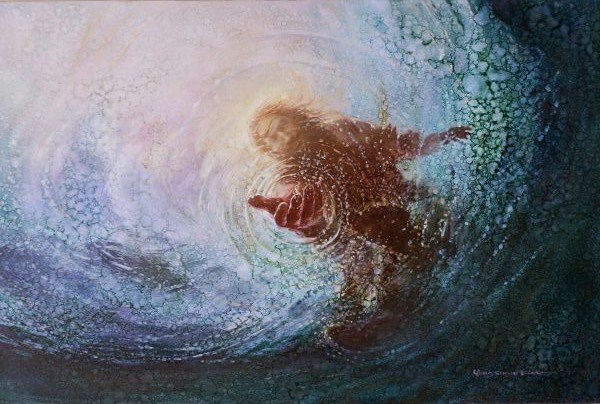Jesus & the Prophets – walking on the waters … (11/01/18)
The dramatic scene of Jesus walking on water is mentioned in three of the four canonical Gospels (see Matthew 14:22-34, Mark 6:45-53, & John 6:15-211), and as such it comes as no surprise to find this same image rooted throughout the Old Testament manuscripts as well – with Job 9:8 plainly stating that “[God] alone stretched out the heavens and walked upon the waves of the sea”, with Sirach 24:5 having God proclaim “I orbited the heavenly sphere alone and walked on the waves of the sea”, and with Psalm 77:19 exclaiming “Your way was through the sea; your path, through the mighty waters.”2 Of course, as Jesus himself pointed out on more than one occasion, the witnessing of such apparent “miracles”3 was not to be seen as a summons to worship him (see Matthew 19:17, Mark 10:18, & Luke 18:19 et al)4, but rather was a call to those doing said witnessing to strengthen their own faith-based potency – by releasing their fears (see Matthew 14:27, Mark 6:50, & John 6:20), setting aside their doubts (see Matthew 6:30, Matthew 8:26, & Matthew 14:31), and then acting accordingly (see Matthew 14:29 & John 14:12 – also Matthew 7:21 & Matthew 24:12-14).

“The exercise of power, no matter how well-intentioned or seemingly divine, always in its end causes suffering. Love, on the other hand – being fully vulnerable, and thus utterly disinterested in all things traditionally seen as mighty or potent – absorbs the suffering of others and brings only peace. And so it is that, in the point of greatest convergence on a hill called Calvary, the celestial Father of Jesus renounced the former for the latter – replaced celebrations of victory with humble acts of service, and renounced all manifestations of power for the sake of perfect harmony … And so it is for all sincere followers of The Way of Christ that they choose over & over again to abide in the inclinations of an enraptured heart, rather than succumb to the cautiously callous reasonings of the theological mind.” ~ inspired by Philip Yancey & A. W. Tozer
…………………………………………………………………………
1 Interestingly, the Johanine account of this tale does not have Jesus entering the boat at all, bur rather has said vessel arriving at the land towards which they were traveling “immediately” after Jesus told the disciples to release their fear.
2 These and all similar references are in all likelihood recalling Genesis 1:2‘s “the Spirit of God sweeping over the face of the waters”, and quite possibly also reference a more literal reading of Daniel 12:5-7 – namely, “One of them said to the man clothed in linen, the one who was above the waters, ‘How long will it be before these astonishing things are fulfilled?’ And the man clothed in linen, the one who was above the waters, lifted his hands toward heaven, swore by Him who lives forever, and said that all would come to pass when the shattering of the power of the holy people had finally come to an end.”
3 Aside from the fact that Jesus repeatedly denied being the agent of such “signs & wonders” (see Matthew 12:38-39, Matthew 16:4, Luke 8:52, Luke 11:29, & John 11:4-11 et al), a number of scholars have specifically noted that the walking on water episode was possibly not miraculous at all – with some suggesting that Jesus’ disciples were confused by the high winds and darkness, some noting that a few Markian manuscripts show Jesus walking on the shore and not the waves, some believing that Jesus merely waded through the surf or the shallows or on a sandbar, and still others believing that the entire tale was merely a potent allegorical metaphor familiar to many cultures … In all fairness, it is also worthy of NOTE that, much like Moses in Exodus 14:21-29 or Elijah in 2 Kings 2:8 (see also Psalm 107:29 & Jonah 1:3-17), Jesus is seen in all three of the Synoptic Gospels as being one with the apparent power to calm high winds and soothe rough seas (see Matthew 8:25-27, Mark 4:35-41, & Luke 8:22-25).
4 NOTE two things of intriguing importance here – 01) that Jesus did not say “I am he” or “it is I” in Matthew 14:27 & Mark 6:50, but rather attempted to calm his disciples by stating “I, I am” (ego eimi, Strong’s #1473 & #1510); a phrase that recalled the holy Spirit of Truth residing within every human Soul, not merely Jesus himself – see also Matthew 16:28, Luke 21:27, John 10:35-36, & John 14:20-26 et al) … and also 02) that Matthew having the disciples label Jesus as being “the Son of God” in Matthew 14:33 (a proclamation fully missing in the reflective accounts of Mark and John) is actually evidence against the veracity of that claim (noting the repeatedly illuminate fact that Jesus’ disciples never once accurately comprehended the message of his ministry – see Matthew 15:16, Matthew 16:12, Mark 4:13, Mark 8:18, Mark 8:33, Mark 10:24-32, John 6:68, John 16:25, & John 20:29 et al).




 ;
;